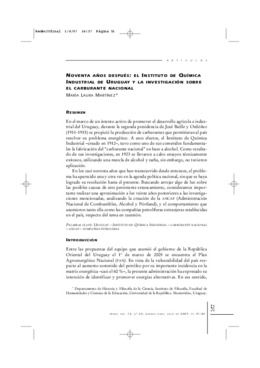Noventa años después : el Instituto de Química Industrial de Uruguay y la investigación sobre el carburante nacional
Ninety years later : the uruguayan Industrial Chemistry Institute and the research on “national fuel.”
Fecha
2007-07Autor
Martínez, María LauraResumen
En el marco de un intento activo de promover el desarrollo agrícola e industrial del Uruguay, durante la segunda presidencia de José Batlle y Ordóñez (1911-1915) se propició la producción de carburantes que permitieran al país resolver su problema energético. A esos efectos, el Instituto de Química Industrial –creado en 1912–, tuvo como uno de sus cometidos fundamentales la fabricación del “carburante nacional” en base a alcohol. Como resultado de sus investigaciones, en 1923 se llevaron a cabo ensayos técnicamente exitosos, utilizando una mezcla de alcohol y nafta, sin embargo, no tuvieron aplicación.
En los casi noventa años que han transcurrido desde entonces, el problema ha aparecido una y otra vez en la agenda política nacional, sin que se haya logrado su resolución hasta el presente. Buscando arrojar algo de luz sobre las posibles causas de este persistente estancamiento, consideramos importante realizar una aproximación a los veinte años posteriores a las investigaciones mencionadas, analizando la creación de la ANCAP (Administración Nacional de Combustibles, Alcohol y Pórtland), y el comportamiento que asumieron tanto ella como las compañías petrolíferas extranjeras establecidas en el país, respecto del tema en cuestión. During the second presidential term of José Batlle y Ordóñez (1911- 1915) and within the context of an active attempt to support the agricultural and industrial development of Uruguay, the production of fuels was promoted in order to allow the country to solve its energy problem. The Industrial Chemistry Institute (IQI) –created in 1912– had as one of itsmain objectives to manufacture national fuel made from alcohol. As a result of its research, in 1923, trials using a mix of alcohol and gasoline were carried out, and although they were technically successful, they never were implemented. Since then, almost ninety years have passed and the problem has emerged once and again in the national political agenda without finding a solution. In order to elucidate some of the possible reasons of this persistent stagnation, we believe it is important to explore the twenty years which followed the mentioned research, analyzing the creation of ANCAP (National Administration of Fuels, Alcohol and Cement) and the behavior assumed by this and other foreign oil companies established in the country regarding this subject.

